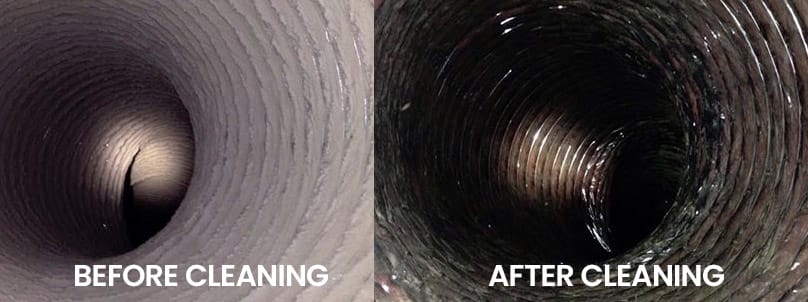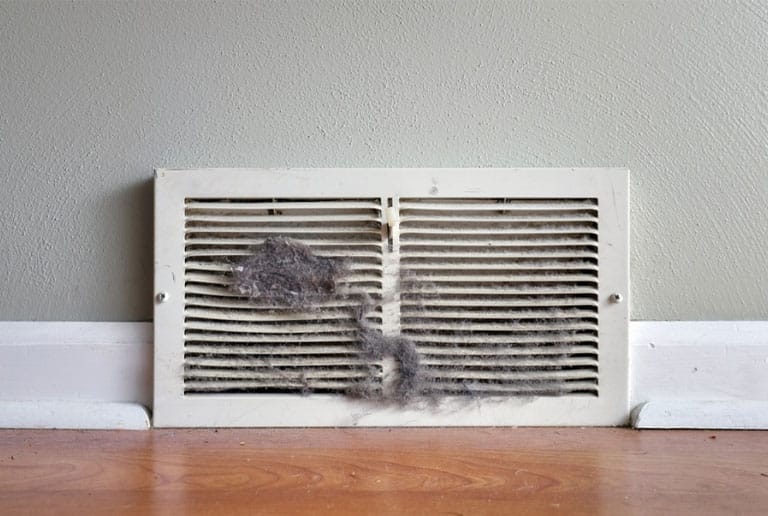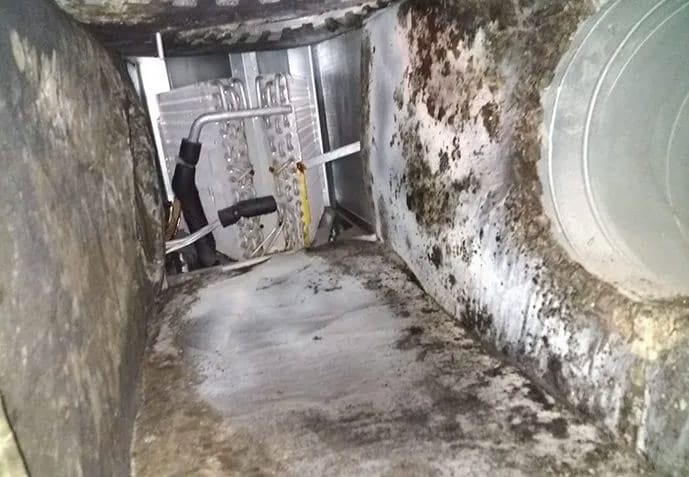Your home’s HVAC system works tirelessly to keep your family comfortable year-round, but one critical component often goes overlooked: your air ducts. These hidden pathways can harbor dust, allergens, mold, and other contaminants that compromise both your indoor air quality and your system’s efficiency. Learning to recognize the signs you need duct cleaning Raleigh NC can save you money, protect your family’s health, and extend the life of your HVAC system.
Raleigh’s unique climate presents specific challenges for homeowners. Our humid summers create ideal conditions for mold growth, while our notorious pollen seasons can overwhelm even the best filtration systems. Combined with pet dander and everyday household dust, these factors make regular duct maintenance essential for Triangle area homes. Understanding how to tell ducts are dirty Wake County residents can take proactive steps to maintain healthier indoor environments.
For comprehensive information on maintaining your home’s air quality, explore our air duct cleaning Raleigh NC page to understand the full scope of expert duct maintenance.
1. Signs You Need Duct Cleaning Raleigh NC: What to Watch For

Your HVAC system communicates through various symptoms when your ducts need attention. Recognizing these HVAC duct cleaning warning signs Raleigh homeowners should watch for can help you address problems before they become costly repairs or health hazards.
Musty or Stale Odors from Vents
One of the most noticeable signs you need duct cleaning Raleigh NC residents often report is the presence of unpleasant odors when their HVAC system kicks on. These musty, stale, or even sour smells are strong indicators of mold, mildew, or decaying organic material lurking inside your ductwork.
In Raleigh’s humid climate, moisture easily becomes trapped in air ducts, creating a perfect environment for bacterial and fungal growth. When your system circulates air, it spreads these contaminants throughout your home—intensifying the odor and possibly triggering respiratory problems. Recognizing these symptoms early is critical for maintaining both indoor air quality and your family’s health.
According to the U.S. Environmental Protection Agency, duct cleaning may be necessary when there’s visible mold, vermin infestation, or substantial dust buildup obstructing airflow—especially in homes with persistent odors or respiratory issues.
What causes these odors:
- Mold and mildew growth in damp ductwork
- Accumulated dust and debris that has become damp
- Dead insects or small animals in the duct system
- Bacterial growth from moisture buildup
- Cigarette smoke or cooking odors trapped in dust
If you notice persistent odors despite cleaning your home thoroughly, it’s time to investigate your ductwork. Professional cleaning can eliminate these odors at their source and prevent them from returning. Learn how moisture issues impact local homes and why addressing them matters with our professional HVAC mold treatment in Raleigh, designed to stop mold growth inside ducts and restore safe indoor air quality.
Rising Energy Bills
Unexplained increases in your monthly energy costs often signal that your HVAC system is working harder than necessary to maintain comfortable temperatures. For many homeowners, this is one of the signs you need duct cleaning Raleigh NC professionals often emphasize. When ducts accumulate dust, debris, and other contaminants, they create resistance to airflow, forcing your system to consume more energy to push conditioned air throughout your home.
How dirty ducts increase energy consumption:
- Reduced airflow efficiency requires longer run times
- Clogged vents and registers restrict air movement
- Dirty coils and components reduce heat transfer efficiency
- System components work harder and wear out faster
Research shows that clean ductwork can improve HVAC efficiency by 15-25%, translating to significant savings on your utility bills. For Wake County residents experiencing rising energy costs, duct cleaning often provides a quick return on investment through reduced monthly expenses.
Signs your energy bills indicate duct problems:
- Gradual increases over several months without rate changes
- Significant spikes during peak heating or cooling seasons
- Higher bills compared to neighbors with similar homes
- HVAC system running longer cycles to reach set temperatures
These warning signs don’t just affect your comfort — they also come with long-term consequences. Learn more about the benefits of professional duct cleaning to improve air quality, lower energy bills, and extend your HVAC system’s lifespan.
Excessive Dust or Pet Hair Around Vents

While some dust accumulation is normal in any home, excessive dust or pet hair concentrated around your vents and registers indicates that your ductwork is circulating contaminants rather than filtering them out effectively. This is particularly problematic for families with pets, as animal dander and hair can quickly overwhelm standard filtration systems.
Common dust and debris indicators:
- Dark streaks or discoloration around vents
- Visible dust bunnies near air returns
- Pet hair accumulating despite regular cleaning
- Dust settling on furniture shortly after cleaning
- Visible particles in sunlight streaming through rooms
Raleigh’s seasonal pollen adds another layer of complexity to this issue. During spring and fall, outdoor allergens infiltrate homes through normal entry and exit, but dirty ducts can trap and redistribute these particles long after pollen season ends.
For households with furry family members, the challenge intensifies significantly. Pet owners need specialized attention to their ductwork maintenance. Discover why Raleigh pet owners need regular duct cleaning and how to protect your family from accumulated pet dander and hair.
Pet-specific duct contamination includes:
- Animal hair and dander trapped in duct bends
- Odors from pet accidents that have dried in ductwork
- Bacteria from pet saliva and skin oils
- Increased allergen circulation affecting sensitive family members
Worsening Allergies or Asthma
If family members experience increasing allergy symptoms, asthma flare-ups, or unexplained respiratory issues, contaminated ductwork could be the culprit. Your HVAC system should filter and clean the air, but dirty ducts can actually worsen indoor air quality by continuously circulating allergens and irritants.
Health symptoms potentially linked to dirty ducts:
- Persistent coughing or throat irritation
- Increased sneezing and nasal congestion
- Watery or itchy eyes
- Fatigue or headaches, especially when indoors
- Worsening asthma symptoms or more frequent attacks
- Skin irritation or unexplained rashes
Raleigh residents face unique challenges from seasonal allergens. Tree pollen in spring, grass pollen in summer, and ragweed in fall can infiltrate homes and become trapped in ductwork. These are classic signs you need duct cleaning Raleigh NC homeowners shouldn’t ignore—especially in high-pollen neighborhoods like Wake Forest and Cary, where allergens accumulate quickly in duct systems. When these allergens accumulate over time, they create a persistent source of indoor air pollution that standard air fresheners or surface cleaning cannot address.
Wake Forest homeowners often experience faster dust buildup due to pine pollen and dense tree cover. Learn how our Wake Forest air duct cleaning service can help reduce dust and improve indoor air quality.

Children and elderly family members are particularly susceptible to poor indoor air quality. Their developing or compromised immune systems make them more vulnerable to the effects of circulating contaminants. Professional duct cleaning can provide significant relief for families dealing with respiratory sensitivities.
Understanding duct cleaning helps Raleigh residents with allergies reveals how professional cleaning addresses specific allergen concerns common in our region, providing targeted relief for sensitive individuals.
Uneven Airflow or Room Temperatures
Inconsistent temperatures throughout your home or noticeably weak airflow from certain vents often indicates obstructed ductwork. Accumulated debris can create partial blockages that prevent proper air distribution, resulting in hot and cold spots that make your living space uncomfortable.
Signs of airflow problems:
- Some rooms consistently warmer or cooler than others
- Weak air movement from specific vents
- Doors slamming shut when HVAC system starts
- Difficulty maintaining set thermostat temperatures
- Some areas of the house rarely reach comfortable temperatures
Wake Forest and Cary homeowners often notice these issues in multi-story homes where ductwork must overcome gravity and distance to deliver conditioned air effectively. In fact, uneven temperatures between floors can be one of the early signs you need duct cleaning Raleigh NC technicians look for during inspections. When ducts are clean and unobstructed, air flows freely to all areas of the home, maintaining consistent comfort levels.
Factors affecting airflow in Triangle area homes:
- Two-story homes with complex ductwork layouts
- Additions or renovations that altered original duct design
- Flexible ductwork that can sag or kink over time
- Undersized ducts in older homes with HVAC upgrades
Visible Mold or Mildew Around Vents
Any visible mold growth around your vents or registers indicates a serious problem requiring immediate professional attention. Mold doesn’t just affect the appearance of your vents; it suggests extensive contamination within your ductwork that poses health risks to your family.
Where to look for mold indicators:
- Black, green, or white discoloration around vent openings
- Fuzzy or powdery growth on registers or grilles
- Water stains or mineral deposits near vents
- Peeling paint or wallpaper around air returns
- Persistent musty odors even after cleaning visible surfaces
Raleigh’s humidity levels, often exceeding 70% during summer months, create ideal conditions for mold growth within ductwork. When combined with dust and organic debris, these conditions can lead to extensive contamination that requires professional remediation.
Health risks associated with mold in ducts:
- Respiratory infections and breathing difficulties
- Allergic reactions including skin and eye irritation
- Headaches and concentration problems
- Worsening of existing asthma or allergy conditions
- Potential toxic reactions in sensitive individuals
Professional mold remediation goes beyond simple cleaning to address moisture sources, sanitize affected areas, and prevent future growth. Attempting DIY mold removal in ductwork can actually spread spores throughout your home, worsening contamination.
Signs of Pest Infestation
Discovering evidence of rodents, insects, or other pests in your ductwork requires immediate professional intervention. Pests leave behind waste, nesting materials, and potentially disease-causing bacteria that compromise your indoor air quality and pose health risks to your family.
Common pest indicators in ductwork:
- Scratching or scurrying sounds from within walls or ceilings
- Droppings or urine stains around vents
- Chewed or damaged ductwork materials
- Nesting materials like paper, fabric, or insulation debris
- Strong ammonia odors from animal waste
- Dead insects or small animals near vents
Wake County’s suburban setting provides ample opportunities for wildlife to seek shelter in homes, particularly during extreme weather. Squirrels, mice, and various insects can infiltrate ductwork through small openings, creating ongoing contamination issues.
Professional pest removal from ductwork involves more than simple cleaning. Technicians must identify and seal entry points, sanitize contaminated areas, and often replace damaged ductwork components. Learn about comprehensive pest guard installation and duct cleaning services that protect your home from future infestations.
2. How Raleigh’s Environment Makes These Signs Worse
The Triangle region’s unique environmental conditions amplify common ductwork problems, making regular professional maintenance even more critical for local homeowners. Understanding these regional factors helps explain when to clean air ducts Wake Forest residents and other Triangle area families should prioritize this essential home maintenance task.
Raleigh’s Climate Challenges:
Our humid subtropical climate creates year-round moisture management challenges. Summer humidity levels regularly exceed 70%, while temperature fluctuations between seasons stress HVAC systems and create condensation within ductwork. This moisture, combined with organic debris, creates ideal breeding conditions for mold, bacteria, and other harmful microorganisms.
Spring pollen seasons in Raleigh are legendary, with tree pollen counts often reaching extreme levels that coat everything in a yellow-green dust. This pollen infiltrates homes through normal daily activities and becomes trapped in ductwork, where it can remain for months after outdoor levels subside.
Construction and Housing Factors:
Many Raleigh area homes feature crawl space construction, which can contribute to moisture and air quality issues. Older homes may have ductwork installed in unconditioned spaces where temperature differentials create condensation problems. Newer construction sometimes features complex ductwork layouts that can trap debris in hard-to-reach areas.
Wake Forest and Cary’s rapid development has resulted in homes with various construction standards and ductwork designs. Some subdivisions built during different decades may have ductwork that doesn’t meet current efficiency standards, making professional cleaning and assessment even more valuable.
Regional Allergen Concerns:
Beyond pollen, the Triangle region hosts various molds, dust mites, and other allergens that thrive in our climate. Red clay soil common in our area can contribute to dust issues, while proximity to both urban pollution and rural agricultural activities creates a complex mix of potential indoor air contaminants.
3. HVAC Duct Troubleshooting vs. Dirty Ducts
Understanding the difference between HVAC system malfunctions and dirty ductwork helps homeowners make informed decisions about maintenance and repairs. While some symptoms overlap, proper diagnosis ensures you address the root cause of comfort and efficiency problems.
Dirty Duct Symptoms:
- Gradual decrease in air quality over months or years
- Odors that worsen when system operates
- Dust accumulation despite regular cleaning
- Allergy symptoms that improve when away from home
- Energy bills that increase gradually over time

HVAC System Issues:
- Sudden loss of heating or cooling capacity
- Strange noises from equipment units
- Frequent cycling on and off
- Visible ice formation on outdoor units
- Electrical problems or blown fuses
Many problems actually involve both dirty ducts and system maintenance needs. A professional assessment can identify whether your issues stem from contaminated ductwork, equipment problems, or a combination of factors requiring comprehensive attention.
When Professional Diagnosis Matters:
Experienced technicians can distinguish between symptoms and identify multiple contributing factors that homeowners might miss. They have specialized tools to inspect deep within ductwork, measure airflow rates, and assess indoor air quality levels that determine the most effective treatment approach. Recognizing subtle warning signs early can help you avoid costly repairs and improve indoor air quality.
Professional diagnosis also identifies safety concerns that DIY inspection might overlook, such as damaged ductwork that could leak carbon monoxide or electrical issues that pose fire hazards.
4. DIY vs. Professional Duct Cleaning in Raleigh
While DIY duct cleaning kits are available at hardware stores, they typically cannot address the comprehensive cleaning needs of most residential ductwork systems. Understanding the limitations of DIY approaches helps homeowners make informed decisions about protecting their investment and their family’s health.
DIY Limitations:
- Surface cleaning only addresses visible contamination
- Lack of specialized equipment for deep cleaning
- Inability to access entire ductwork system
- Risk of damaging flexible ductwork or components
- No way to sanitize or treat mold contamination
- Missing moisture sources that cause recurring problems
Professional Advantages:
- Complete system inspection identifies all problem areas
- Specialized equipment removes embedded contamination
- Sanitization treatments prevent future growth
- Simultaneous system maintenance and efficiency optimization
- Identification and sealing of air leaks
- Documentation for warranty and insurance purposes
Professional duct cleaning involves multiple steps that DIY approaches cannot replicate. Technicians use truck-mounted vacuum systems that create negative pressure throughout the ductwork while simultaneously agitating debris with specialized brushes and tools. This dual-action approach removes contamination that surface cleaning cannot reach and addresses many of the hidden signs you need duct cleaning Raleigh NC homeowners may not even realize are affecting their air quality.
Sanitization treatments applied after cleaning prevent immediate recontamination and provide longer-lasting results. Professional equipment can also identify and address air leaks that reduce efficiency and allow unfiltered air to enter your ductwork.
For a detailed comparison of approaches, review DIY vs professional duct cleaning in Raleigh to understand why expert service provides superior results and long-term value.
Professional Inspection Benefits:
- Camera inspection reveals hidden contamination
- Airflow measurement identifies efficiency problems
- Moisture detection prevents future mold growth
- System optimization recommendations
- Warranty protection for cleaning services
5. Ready for a Cleaner Home?
Recognizing the signs that your Raleigh home needs professional duct cleaning empowers you to take proactive steps toward better indoor air quality, improved HVAC efficiency, and enhanced family health. The combination of our region’s challenging climate conditions and the complexity of modern ductwork systems makes professional cleaning an essential investment in your home’s comfort and value.
Professional duct cleaning addresses multiple concerns simultaneously: removing accumulated contaminants, improving system efficiency, extending equipment life, and creating healthier indoor environments for your family. The process involves comprehensive inspection, thorough cleaning, sanitization, and often minor repairs that DIY approaches cannot provide.
For Raleigh area homeowners, timing matters when scheduling duct cleaning services. Understanding how often Raleigh homes should schedule duct cleaning helps you maintain optimal indoor air quality year-round while maximizing the value of your investment.
Quality certified air duct cleaning requires experienced specialists who understand local environmental challenges and have the equipment and expertise to address them effectively. Professional services provide thorough documentation, warranty protection, and ongoing maintenance recommendations that protect your investment.
Take Action Today:
We proudly serve Raleigh and surrounding areas. Book your duct inspection with our Raleigh duct cleaning team today.
Don’t wait for symptoms to worsen or energy bills to increase further. Contact our experienced Raleigh duct cleaning team for a comprehensive inspection and customized cleaning plan that addresses your home’s specific needs. Our local expertise, advanced equipment, and commitment to customer satisfaction ensure you receive superior results that improve your family’s comfort and health. If you’re comparing options and starting your search locally with duct cleaning near me we provide fast response times and dependable coverage throughout the Triangle.
Looking for trusted results fast? Our professional duct cleaning services in Raleigh are just a click away.
Contact our Raleigh duct cleaning team today to schedule your professional inspection and discover how clean ducts can transform your home’s comfort and air quality.
11. Frequently Asked Questions: Duct Cleaning in Raleigh
1. What are the most common signs you need duct cleaning in Raleigh NC?
These are some of the most frequent signs you need duct cleaning Raleigh NC homeowners should look for — including musty odors from vents, rising energy bills, excess dust around vents or on furniture, increased allergy symptoms, visible mold near registers, and inconsistent room temperatures. These issues are often triggered by Raleigh’s humidity, pollen, and indoor air quality challenges.
2. How often should homeowners in Wake County schedule duct cleaning?
In Wake County, most homes benefit from duct cleaning every 3–4 years. However, if you have pets, allergies, or recent renovations, cleaning every 2–3 years is recommended. High pollen seasons in Raleigh and surrounding areas may require even more frequent maintenance to ensure optimal air quality.
3. Does dirty ductwork affect allergies and asthma?
Yes. Dirty ducts can circulate allergens like dust mites, pollen, mold spores, and pet dander, worsening allergy and asthma symptoms. This is especially problematic during Raleigh’s spring and fall allergy peaks. Cleaning your air ducts helps reduce indoor triggers and improve overall respiratory health for your family.
4. Can I clean my air ducts myself?
DIY duct cleaning is not recommended for full-system maintenance. Most household tools cannot reach deep duct runs, dislodge compacted dust, or sanitize mold-prone areas. Professional technicians use high-powered vacuums, agitation tools, and sanitizers to ensure a thorough and safe cleaning.
5. What does professional duct cleaning include?
A professional duct cleaning includes a full inspection of your HVAC system, cleaning of supply and return vents, agitation of debris, vacuuming with negative pressure equipment, and optional sanitization. In Raleigh, many services also include recommendations for mold control and HVAC efficiency improvements.
6. What areas does DuctNClean serve for air duct cleaning?
DuctNClean provides residential and commercial air duct cleaning throughout Raleigh, Wake Forest, Cary, Apex, Knightdale, Garner, and the entire Wake County area. We offer same-day service in many Triangle locations — just call 984-301-8445 to schedule your appointment.



